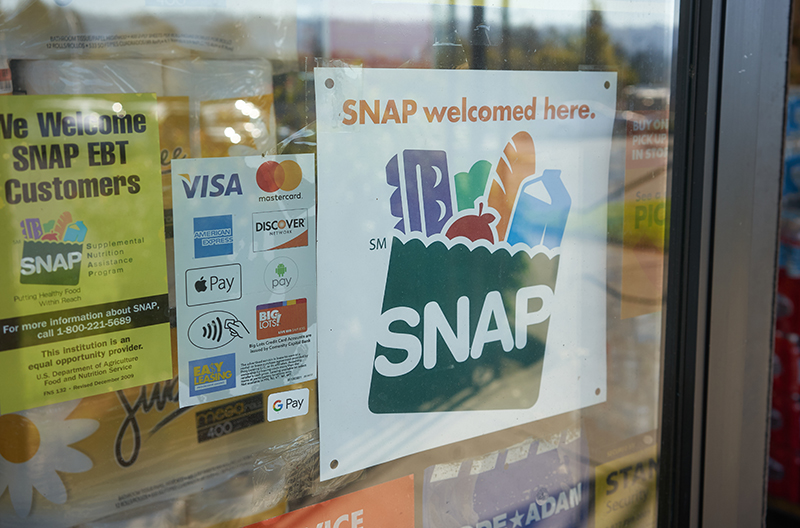The National Grocers Association (NGA), FMI – The Food Industry Association, the Pennsylvania Food Merchants Association and the Wisconsin Grocers Association are urging Congress and local congressional delegations to take immediate action to reopen the federal government and prevent disruptions to the Supplemental Nutrition Assistance Program (SNAP).
National Grocers Association
“With funding for access to healthy, nutritious food at risk of running out for the nearly 48 million combined Americans who depend on the Supplemental Nutrition Assistance Program (SNAP) and the Special Supplemental Nutrition Program for Women, Infants, and Children (WIC), the National Grocers Association (NGA) calls on leaders in Congress from both sides of the aisle to find a funding solution that reopens the government as quickly as possible,” said Greg Ferrara, NGA president and CEO.
“Independent grocers are often the only source of fresh produce, dairy and other nutritious essentials for millions of families, veterans and seniors that rely on federal nutrition assistance to make ends meet. A lapse in funding will disrupt food access, creating instability for shoppers, retailers and communities alike.
“A powerful economic engine for communities big and small, SNAP supports over 388,000 American jobs, generating over $20 billion and $4.5 billion in wages and tax revenue, respectively. NGA urges Congress to act swiftly to ensure continuous funding for SNAP and WIC so that families can continue to put food on the table. Protecting these programs is an investment in the health, stability and well-being of Main Street communities across the country.”
Pennsylvania Food Merchants Association
In a letter sent Oct. 21, PFMA President and CEO Alex Baloga warned that delayed November SNAP benefits could create “an operational nightmare” for food retailers and distributors across Pennsylvania. The letter cites a recent USDA directive instructing state agencies to hold November issuance files until further notice due to insufficient federal funding.
“Our members are the backbone of the SNAP delivery system,” Baloga wrote. “A delayed and uncertain benefit issuance schedule would cause supply chain shocks, cash flow problems for small stores and confusion at the register for customers who depend on these benefits to feed their families.”
Baloga emphasized that Pennsylvania’s complex SNAP distribution schedule leaves little room for disruption. A sudden change in benefit timing, he said, would make accurate demand forecasting impossible and could leave shelves bare of fresh foods like produce, dairy and meat.
In a statement following the letter, Baloga added: “SNAP isn’t just a safety net for families, it’s a stabilizing force for local economies. If benefits are delayed, the effects will ripple through every corner of Pennsylvania’s food and beverage industry. Congress must act now to restore operations and protect access to food for millions of people.”
[RELATED: NGA, Food Industry Groups Seek USDA Clarity On Penny Shortage, SNAP Rounding]
FMI – The Food Industry Association
FMI also urged Congress for a second time to reopen the government to ensure continued funding for SNAP and the Special Supplemental Nutrition Program for WIC, which are vital to helping struggling families put food on their tables.
“As an industry that serves families in every community in America, we know firsthand how essential federal hunger and nutrition programs like SNAP and WIC are to customers experiencing difficult times and to the overall stability of our food system,” said FMI Chief Public Policy Officer Jennifer Hatcher.
“When one leg of the stool that the government committed to provide is removed, it doesn’t just affect customers’ ability to feed their families; it also impacts store scheduling of employees, supplier orders and staffing, and the tax base of local economies across the country. We appreciate the efforts many states have made to try to provide short-term funding solutions in this time of need, and we’re proud of the way retailers and suppliers continue to support their communities during this period of uncertainty through donation programs and working with neighborhood groups. However, long-term stability for SNAP and WIC and vulnerable families requires the restoration of the federal commitment to these programs.
“We once again urge Congress to act immediately to restore government funding, provide clarity and food for families in need, and ensure that these vital programs remain dependable for those who have to rely on them to get them through a difficult time.”
Wisconsin Grocers Association
Through its electronic newsletter to members, the Wisconsin Grocers Association shared signage for grocers to download and use here. The association also shared some considerations for grocers to take into account such as:
- Communicate with local food pantries and community organizations to coordinate support and donations.
- Inform staff to handle increased customer inquiries and potential frustration with empathy and clarity.
- Monitor sales date closely to identify shifts in demand and adjust supply chains accordingly.
The Wisconsin Grocers Association will “continue to provide updates and advocate for federal action. The message for Wisconsin grocers from D.C. last week was that “political” dialogue continues and that the “policy” discussion has not started. However, this is a fluid situation and could change rapidly.”
Several ways grocers can help are by:
- Hosting food drives
- Set up collection bins in stores for customers to donate.
- Offer small incentives, such as coupons, for donations.
- Creating emergency meal kits
- Assemble low-cost kits with essential items for families.
- Sell at cost or donate through local charities.
- Providing store gift cards for families in need
- Work with local nonprofits to distribute gift cards.
- Allow customers to purchase and donate cards at checkout.
- Partnering with local businesses and farms
- Coordinate surplus food donations.
- Support community meal programs.
- Rounding up for local food pantries
- Pick your local food pantry, and offer a round up option for customers.

